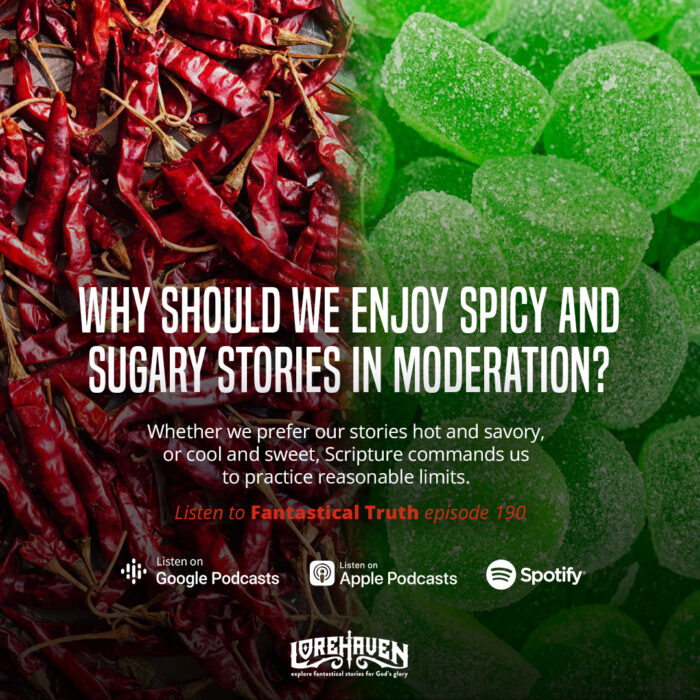190. Why Should We Enjoy Spicy and Sugary Stories in Moderation?
Podcast: Play in new window | Download (Duration: 1:24:18 — 78.5MB) | Embed
We have already seen Halloween, full of candies and other tricky treats.1 Next came Thanksgiving with its famous feasting. Finally we get the grand finale of festivals: the Advent season leading up to Christmas. So much spicy. So much sugar. These reminded us about fantastical stories and other creative works. Some might have the spicy bite of sarcasm. Others fill you up with too much sugar. How’s a Christian fan to handle these ingredients with wisdom?
Subscribe to Lorehaven
middle grade • teens + YA • adults • onscreen • author resources • gifts • guild
Episode sponsors
- Enclave Publishing: Lumen by J. J. Fischer
- Secret of the Lost Dragons by Phyllis Wheeler
- I. W.R.I.T.E.: How to Write a Novel course
Concession stand
- Here we use “spicy” not about sensuality, but satire, parody, edginess.
- We’ll try to avoid squishy and extra-biblical terms like “gray areas.”
- But we’ll also avoid absolute declarations about what’s right and wrong.
- For issues that aren’t clearly right or wrong, the Bible has other words.
- We’ll use those, such as “meat sacrificed to idols” or simple “wisdom.”
- Also, you may get hungry, because we’re using a lot of food metaphors.
1. What do we mean by ‘spicy’ creative works?
- Stephen thought about this after a certain culturally conservative movie.
- It was a surprise drop by the same guys we talked about in episode 188.
- Unlike kids’ shows or fantasy drama, this was a vulgarian sports comedy.
- Personalities promoted it by promising it will “trigger the right people.”
- Basically it was weaponizing a non-fantastical story to “own the libs.”
- Meanwhile, Christians are debating Douglas Wilson, a popular pastor/satirist.
- Wilson is also the father of the popular fantasy author N. D. Wilson.
- So all this discussion affects Christian fantastical fans one way or another.
- Some critics don’t like spice because it’s off-putting to them or others.
- Others point to biblical mockery and say the parody is morally fair-use.
2. What do we mean by ‘sugary’ creative works?
- This one might be easier or harder to define. We can all imagine these.
- Stephen’s examples: the worst MCU movies, kitsch, silly evangelical stuff.
- And at this time of year, everyone jokes about hate-watching Hallmark.
- To sum up, we mean intentionally cozy, sentimental, sticky-sweet stuff.
3. How can we enjoy either ‘treat’ in moderation?
- Note our use of the word. It’s a mature and firmly biblical concept.
- It’s also taught in Scripture texts that encourage self-control.
- Other translations use fine old words like “temperance.”
- But the word is used in Phil. 4:5 (in the KJV). Here’s that text in the ESV:
Rejoice in the Lord always; again I will say, rejoice. Let your reasonableness be known to everyone. The Lord is at hand; do not be anxious about anything, but in everything by prayer and supplication with thanksgiving let your requests be made known to God. And the peace of God, which surpasses all understanding, will guard your hearts and your minds in Christ Jesus.
Finally, brothers, whatever is true, whatever is honorable, whatever is just, whatever is pure, whatever is lovely, whatever is commendable, if there is any excellence, if there is anything worthy of praise, think about these things. What you have learned and received and heard and seen in me—practice these things, and the God of peace will be with you.
Philippians 4:4–9 (ESV)
- Notice the apostle Paul’s frame. Moderation is same as reasonableness.
- It doesn’t come from dour self-restriction or legalism, but from rejoicing.
- This moderation doesn’t make you anxious. It makes you thankful.
- And it is part of enjoying all those things we ought to think about.
- Right now, the “sweet” people are happy, but the “spicy” sorts may be upset.
- The folks who like spicy stuff are tired of hearing that “clobber verse.”
- Of course, Philippians 4 doesn’t rule out edgier parts of the Bible or reality.
- Those elements, after all, would fall under whatever is true or just.
- We can use those clauses to correct any saccharine sweetness. As we do.
- But I’d also point out: when folks are binging on spicy, they get serious.
- Last week, I re-learned some don’t like challenges about moderation.
- They act like they’ve been accused of consuming poisonous foods.
- And they act like you’re trying to make them eat fat-free kale casserole.
- Not so. Thus the food metaphor: spicy and sugary things that we enjoy.
- But we enjoy these in moderation. If you binge on them, it’s bad for you.
- That’s what we’d call for. And it takes joyful maturity to apply this.
- If folks like spicy creative works in moderation, they’ll respond well.
- And if other folks like sugary stories in moderation, they’ll respond well.
- But pity the person who angrily defends this “freedom” for its own sake.
- Ultimately that won’t make you happy, or even win a just culture war.
- Instead you’ll get sick on the sweetness, or burn your stomach for battle.
- Worse, it’ll deaden our sense of delight in the Christ for whom we fight.
Com station
- What are your favorite spicy or sugary stories for the season?
- How do you practice moderation in enjoying these gifts?
Wilda remarked about Marian Jacobs’ mixed movie review:
My husband and I just saw it and we enjoyed the music and the beauty but we really did not like how they portrayed the three kings. We did not like the comedic part. It felt weird and disrespectful. Why did they choose to have King Herod’s son in a role and more importantly choose to help them escape is beyond our understanding. Why not stick to the story in truth? I enjoyed it for the most part but I can see how some Christians will have a problem embracing it.
Tyrean wasn’t a fan of some content in Stephen Lawhead novels:
In so many of his book series, Lawhead includes casual disregard, and sometimes verbal and physical abuse of female characters. I never finished the Pendragon cycle, but I remember this distinctly in Hood; in one scene Robin Hood (the hero) slaps Marian and then justified his actions as necessary. It is sickening and not in line with Biblical values.
Mission update
- Recent review and book quest for A Soul As Cold As Frost
- Upcoming review of H. L. Burke’s A Superhero for Christmas
- Subscribe free to get updates and join the Lorehaven Guild
Next on Fantastical Truth
Did you ever read the essay where C. S. Lewis criticized trump… ery? At the holiday season? “They buy gifts for one another such things as no man ever bought for himself,” Lewis lamented. But he did love Christmas. So did professor J. R. R. Tolkien, who celebrated so hard that he ghost-wrote letters from Father Christmas, from the North Pole, for his own children. What can we learn about critiquing yet celebrating Christmas from these two legends?
- Featured images from Abhishek Hajare on Unsplash (red chilis) and Alexander Schimmeck on Unsplash (green candy). ↩





































What constitutes sweet or spicy vs something of substance may depend on the person, because everyone has different reasons for watching a show, and each person gets something a little different out of it. There’s been shows that, to me, seemed sweet or spicy in a frivolous manner, but then there were other people that got something meaningful out of them. My preferred story ‘diet’ tends to be mainly dark and serious tales that reflect the ups and downs of life — things with meaning and substance to them. But sometimes I like those stories to be ‘flavored’ with a bit of the sweet and spicy, because those things are part of life too.
When it comes to sweet and spicy, though, I sometimes care more about fan responses than what the author writes. I constantly read the comments sections on stories, articles, Youtube videos, etc, and there are a lot of people that desire sweet saccharine stories and decry toxic behavior, while also being toxic themselves. A lot of people view themselves as the noble, sweet, heroic character, and they idealize that because they see it as the opposite of whatever hurt them in the past. Unfortunately, however, there’s times when they act more like the petty vengeful characters that harm others in an attempt to punish whoever they think deserves it.
This can really put me off of certain sweet or spicy stories when they feel like a part of that dynamic. I’m still pinpointing exactly what’s going on with these kinds of stories (and fan responses), but I think part of it is people taking on a victim or savior complex that justifies harming whoever they feel deserves it at the moment. But the sweet stories coat it over with a veneer of niceness that makes these problems much harder to point out and address. It also shows a lack of self awareness in many people, and gives the stories and fan commentary a passive aggressive vibe. It’s fascinating, and reveals a lot about human nature, so I like it from that standpoint. It’s important to study, because some of those dynamics explain a lot of what is happening in our society today. At the same time, it can be unsettling and make certain stories less enjoyable, because it exposes dangerous patterns in human behavior that are causing a lot of problems, and it looks like people are allowing these stories to reinforce that toxic behavior instead of encouraging them to overcome it.
I don’t always gravitate toward spicy stories, either, but I like them for social commentary, and even if they’re outrageous or meant to offend, they’re extremely useful for opening up a conversation. I saw a video responding to the sports comedy you talked about in the podcast…I’m not sure if you’re ok with me posting a link to the video? It’s good commentary, but it would reveal the name of the show, which you avoided mentioning in the podcast. But, anyway, the video was by someone that saw the premiere and isn’t a super conservative guy, but he liked the movie quite a bit. He showed a couple of the negative responses people had to the movie, and those negative responses reveal misconceptions that trans activists have about the people they disagree with. Witnessing those misconceptions is an opportunity to see how we can communicate better when tackling these issues; and since people on both sides are probably going to be squabbling with each other in comments sections about this movie, it’s at least getting both sides talking to each other.
That opens up a channel where people who WANT to have a constructive conversation can go in and start bridging the gap and doing some problem solving. To an extent I would liken it to the previous Lorehaven article about Fast and the Furious. It may not have handled everything well, and a lot of people reacted negatively to it. But it opened up an opportunity for people in the comments section to have a somewhat more nuanced conversation, and some people seemed to benefit from that. Obviously people should try to communicate as well as possible, but we definitely shouldn’t dismiss the fact that more ‘outrageous’ stories can act as icebreakers for conversations we need but probably would be too afraid to have otherwise.
‘The right people are angry’ can be a good phrase for giving people courage to speak out, or as a bit of edgy fun. So from that standpoint it’s good in small quantities. But it can also be detrimental if it’s used as a regular mindset, because it can cause people to overlook information they may actually need to consider. If people are constantly dismissing outrage as ‘making the right people angry’, they’re a lot less likely to listen to details they might need to hear in order to solve the situation.
Listening to what the other side has to say doesn’t mean bowing to the ‘enemy’. It means figuring out everything that is going on so that better strategies can be built. Even if the other side is wrong in their behavior, they may still point out problems that need to be fixed. That doesn’t justify their behavior, but if we want to be right we have to actually DO the right thing and be constructive problem solvers, instead of just wallowing in our favorite ways to talk and rant about stuff.